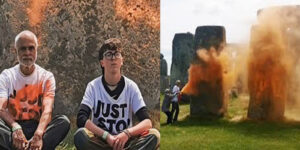There are those who consider a lecture on ancient discipline as intolerable as a beheading.
During the last few months many journalists have raged against perceived excesses and moral lapses of the Indian government. In turn, the journalists have been criticised in the social media for their hypocrisy.
Many historians have also piled on in their criticism of the government. One old worthy went as far as to say that the RSS and ISIS are quite like each other. A scribe countered: “Anyone who compares the RSS & ISIS should visit both. One will behead him, the other will give him a lecture on Vedic science.” There are those who consider a lecture on Vedic science as intolerable as a beheading.
So what is this about Vedic science that gets people worked up? One specific matter that angered was the claims by ministers that ancient India had science, and not all that is admirable outside of religion, yoga, and the symbol for zero has come from outside. After some very nasty columns accused the ministers of chauvinism, communalism and made-up history, I was approached, as a historian of science, to deliver the coup de grace to this atavistic monster.
But the claims made by the ministers are broadly right and the journalists could have checked them out by a simple search on the internet. What can we do if it is true that the first atomic theory of matter was conceived in India, and the Pythagoras Theorem was proved in India several centuries before Greece? Likewise, Indian mathematics and astronomy were ahead of their European counterparts for centuries until the medieval times, and it was then that the adoption of the Indian numerals brought about a renaissance in European mathematics.
More recently, the idea of inoculation went from India and transformed Western medicine. Mendeleev was inspired by the Sanskrit alphabet to create his periodic table of elements. Schrodinger, one of the creators of quantum mechanics, credited the Upanishads for the idea of superposition that is central to that theory.
Even Indian technology was good. As just one example, Damascus steel, of which the best sword blades were made, was based on wootz steel imported from India. Economists tell us that for centuries, until the Industrial Revolution of the 19th century, about 30 per cent of the world economic output came from India, and this couldn’t have been done by naked sadhus alone! India had its artists, engineers, bankers, doctors, philosophers, and thinkers.
I am not trying to claim that everything important originated in India. Other civilisations made their own unique contributions to art and science and they may very well have lists as impressive as India’s. But it should not be a crime to acknowledge facts that are accepted by historians the world over.
What is fascinating is that the journalists have become a kind of a thought police. One is not allowed to speak of India’s past lest it amount to bragging that might hurt the sentiments of some minority groups in India or perhaps that of Europeans.
This is bizarre and patronising. Most people are reasonable. No one cares for the nostrums of the colonial times and people realise that in many ways the past doesn’t matter. The strength of a country or civilisation comes from the strength of its economy and its cultural and military power.
Some journalists want to counter this talk of Indian past by bashing current cultural practices and they do so by crossing ethical boundaries. It is perfectly all right for an activist or an opinion writer to express their disapproval of one thing or the other, but the anchor of a show (like the referee of match) is not to reveal his or her own biases and prejudices, nor disrespect any position. If a Western anchor were to do so even on Twitter, they will be sure to lose their job. Indian anchors do not appear to be bothered by this fine point and just the other day one of them poked fun at the Hindu custom of Karva Chauth when they would not dare to speak disparagingly of any other tradition.
Secularism means not being disrespectful to believers of any religion. Why criticise the immersion of images in the sea when remaining silent at the cutting down of countless trees for Christmas decoration? Journalists should calm down. It is not dangerous for people to be curious about their past. Indeed, one must know the past well in order to make the right choice for the future from the many that are possible.
subhash kak
The Daily Opinion






























